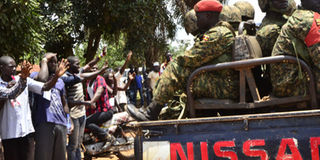Uganda and The Plague

Kyadondo East MP Robert Kyagulanyi’s supporters wave at soldiers who were deployed on the streets as the lawmaker returned from the US recently. PHOTO BY ALEX ESAGALA
In his 1947 novel The Plague, Albert Camus imagines the reactions of the citizens of the Algerian port city Oran to an epidemic of the disease that gives the book its name.
Father Paneloux warns his flock that the plague is all part of God’s plan. Dr Rieux tries to keep people alive. Scoundrel Cottard makes a fortune smuggling people and goods through the quarantine barrier erected by the authorities.
Journalist Rambert, trapped on the wrong side of the barrier, bribes Cottard to arrange his escape. The death toll mounts and resignation haunts the city. It’s widely believed that Camus intended Oran’s plague to be a metaphor for the rise of Fascism in Europe and its triumphant defeat in 1945. The book came to mind in August, when four parliamentarians and dozens of their supporters were brutally arrested during the Arua by-election campaigns.
When the defendants finally emerged from a Prisons bus at the Gulu Magistrates Court weeks later, several, including Kyadondo East MP Bobi Wine were on crutches and had to be carried down the steps.
Night Asara was still bleeding and Shaban Atiku, who may never walk again, collapsed in court. Mityana Municipality’s Francis Zaake was meanwhile on life support in Rubaga Hospital, having been dumped outside the gates under cover of darkness.
The Plague came to mind again when Bobi Wine returned from medical leave in the US on September 20, and security officers began chasing down and beating unarmed pedestrians wearing red People Power T-shirts to honour their hero.
The cruelty of these images summoned up a flood of others: Betty Nambooze crippled and bedridden after the Special Forces raid on Parliament one year ago; the burnt villages of Amuru; the corpses sprawled outside the ruined Rwenzururu Palace in 2016; Cerinah Nebanda’s white coffin on the floor of Parliament in 2012; Kizza Besigye staggering and blinded by pepper spray during the 2011 walk-to-work protests.
In response to international condemnation of the torture of Wine and the others, government representatives have responded, like the authorities in Camus’ Oran, with banal abstractions that creak under the weight of their own contradictions.
“Interfering in the affairs of other countries is morally and practically wrong,” President Museveni insisted, neglecting to mention that his weapons of repression were donated by the US.
“We practice democracy,” Uganda’s ambassador to the US Mull Katende told Voice of America, contradicting Security minister Gen Elly Tumwine who said, “It’s not Parliament who are going to discipline [the security forces].”
“If indeed Bobi Wine was tortured,” wrote presidential spokesperson Ofwono Opondo, “he should quickly return to Uganda to raise those matters before court,” without acknowledging that the courts are stacked with Museveni appointees and that for cases with the slightest political wrinkle, justice is impossible.
In this week’s press conference, Bobi Wine urged everyone – soldiers, religious leaders, barbers and businesspeople to join the struggle. But how can one do that when faced with the government’s tanks and guns?
In The Plague, things finally begin to get better when the people of Oran commit themselves to acting with compassion, putting the suffering of others before their own interests.
The first inkling of this shift comes late in the novel, when the journalist Rambert, having secured a clandestine escape route, changes his mind and stays to assist Oran’s stricken people.
Then the detached, rule-bound magistrate Othan, at first too taken up with remote officialdom, devotes himself to helping others too after his own son dies.
“In the never-ending fight against terror and its relentless onslaughts,” Camus writes, the people, “unable to be saints, but refusing to bow down to pestilences, [must] strive their utmost to be healers.”
Eventually, the plague dies down, the quarantine barriers are taken down and the people are free. This should give Ugandans and those who care about them hope.
When the nation finally gains its freedom, the battle will be won not in the courts, or in the barracks or even in Parliament, but in the myriad decent actions of thousands, even millions, of Ugandans at home and abroad.
It will have begun with the four MPs who were jailed for calling for an investigation into Cerinah Nebanda’s death; it will have begun with the Uganda Human Rights Commission, which requested the police to allow Nambooze to travel to India for urgent medical treatment; it will have begun with Bobi Wine’s promise to care for the family of his slain driver Yasin Kawuma; it will have begun with the courageous diaspora crowds who turn out on the streets of cities all over the world to march for People Power, despite the risk of permanent exile or imprisonment at home.
The greatest danger is that this wave of decency will be derailed by rumours and agents provocateurs, planted to sow discord and suspicion and commit crimes that will be used to justify further crackdowns against People Power activists.
This is where faith comes in—not the fire and brimstone warnings of a Father Paneloux blaming the people for their plight, but in the simple faith of the oppressed united in a spirit of humanity. As Bobi Wine’s hero Martin Luther King put it, “unarmed truth and unconditional love will have the final word in reality. This is why right, temporarily defeated, is stronger than evil triumphant.”
Helen Epstein is the author of Another Fine Mess: America, Uganda and the War on Terror.




